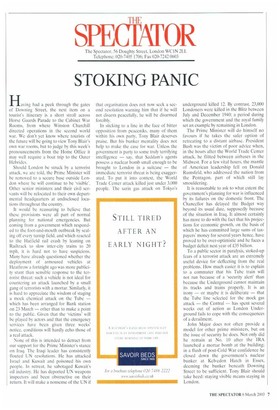STOKING PANIC
Having had a peek through the gates of Downing Street, the next item on a tourist's itinerary is a short stroll across Horse Guards Parade to the Cabinet War Rooms, from where Winston Churchill directed operations in the second world war. We don't yet know where tourists of the future will be going to view Tony Blair's own war rooms, but to judge by this week's pronouncements from the Home Office it may well require a boat trip to the Outer Hebrides.
Should London be struck by a terrorist attack, we are told, the Prime Minister will be removed to a secure base outside London where he will continue to be 'visible'. Other senior ministers and their civil servants will be relocated to their own departmental headquarters at undisclosed locations throughout the country.
It would be reassuring to believe that these provisions were all part of normal planning for national emergencies. But coming from a government which responded to the foot-and-mouth outbreak by sealing off every turnip field, and which reacted to the Hatfield rail crash by leaning on Railtrack to slow inter-city trains to 20 mph, it is hard not to have suspicions. Many have already questioned whether the deployment of armoured vehicles at Heathrow a fortnight ago was more publicity stunt than sensible response to the terrorist threat: such a vehicle is not ideal for countering an attack launched by a small gang of terrorists with a mortar. Similarly, it is hard to appreciate the wisdom of staging a mock chemical attack on the Tube — which has been arranged for Bank station on 23 March — other than to make a point to the public. Given that the 'victims' will be played by actors and that the emergency services have been given three weeks' notice, conditions will hardly echo those of a real attack.
None of this is intended to detract from our support for the Prime Minister's stance on Iraq. The Iraqi leader has consistently flouted UN resolutions. He has attacked Israel and Kuwait and poisoned his own people. In retreat, he sabotaged Kuwait's oil industry. He has deported UN weapons inspectors and been obstructive on their return. It will make a nonsense of the UN if that organisation does not now seek a second resolution warning him that if he will not disarm peacefully, he will be disarmed forcibly.
In sticking to a line in the face of bitter opposition from peaceniks, many of them within his own party, Tony Blair deserves praise. But his bunker mentality does not help to make the case for war. Unless the government is party to some truly terrifying intelligence — say, that Saddam's agents possess a nuclear bomb small enough to be brought to London in a suitcase — the immediate terrorist threat is being exaggerated. To put it into context, the World Trade Center attack killed just under 3.000 people. The sarin gas attack on Tokyo's underground killed 12. By contrast. 23,000 Londoners were killed in the Blitz between July and December 1940; a period during which the government and the royal family set an example by remaining in London.
The Prime Minister will do himself no favours if he takes the safer option of retreating to a distant airbase. President Bush was the victim of poor advice when, in the hours after the World Trade Center attack, he flitted between airbases in the Midwest. For a few vital hours, the mantle of American leadership fell on Donald Rumsfeld, who addressed the nation from the Pentagon, part of which still lay smouldering.
It is reasonable to ask to what extent the government's planning for war is influenced by its failures on the domestic front. The Chancellor has delayed the Budget way beyond its usual date, supposedly because of the situation in Iraq. It almost certainly has more to do with the fact that his projections for economic growth, on the basis of which he has committed large sums of taxpayers' money for several years hence, have proved to be over-optimistic and he faces a budget deficit next year of £35 billion.
To a public sector in paralysis, stoked-up fears of a terrorist attack are an extremely useful device for deflecting from the real problems. How much easier it is to explain to a commuter that his Tube train will not run because of a 'security alert' than because the Underground cannot maintain its tracks and trains properly. It is an irony — or maybe it is deliberate — that the Tube line selected for the mock gas attack — the Central — has spent several weeks out of action as London Underground fails to cope with the consequences of a derailment.
John Major does not often provide a model for other prime ministers, but on the issue of security he does. Not only did he remain at No. 10 after the IRA launched a mortar bomb at the building; in a flush of post-Cold War confidence he closed down the government's nuclear bunker at Kelvedon Hatch in Essex, deeming the bunker beneath Downing Street to be sufficient. Tony Blair should take heed: staying visible means staying in London.


































































 Previous page
Previous page